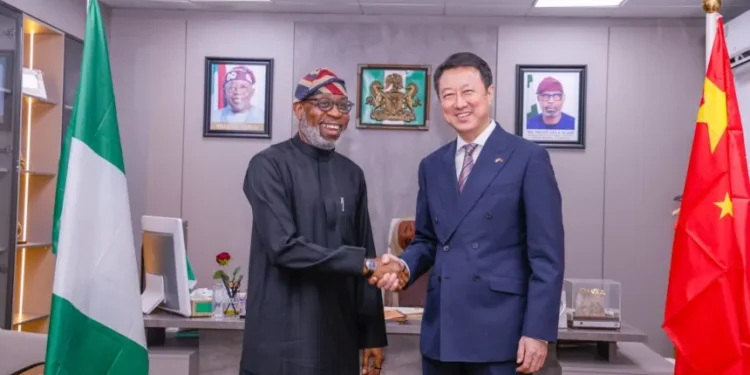China plans to set up electric vehicle (EV) factories in Nigeria, strengthening bilateral ties and supporting local lithium-based manufacturing. Nigeria eyes EV production to drive green growth and industrialisation.
The development was revealed in a statement issued by Segun Tomori, Special Assistant on Media to Nigeria’s Minister of Solid Minerals Development, Dr. Dele Alake. The announcement follows a high-level bilateral meeting between Minister Alake and China’s Ambassador to Nigeria, Yu Dunhai.
According to Tomori, Ambassador Dunhai reiterated China’s strong commitment to supporting Nigeria’s solid minerals sector, describing the proposed EV factories as a crucial avenue for local value addition and deeper industrial cooperation.
Ambassador Dunhai, as quoted in the statement said, “Chinese companies are already significantly involved in Nigeria’s mining sector, from exploration to processing.”
He noted that establishing EV plants would unlock the full potential of Nigeria’s mineral wealth, particularly lithium, and contribute significantly to the country’s economic diversification strategy—one of the eight pillars in President Bola Tinubu’s agenda.
The ambassador cited the recent state visit of President Tinubu to China as a pivotal moment in deepening relations between the two nations.
“We aim to deepen this collaboration, especially in line with President Tinubu’s economic agenda, which includes diversification through solid minerals development.”
Yu Dunhai, China’s Ambassador to Nigeria

Dunhai also emphasized that China’s growing role in Africa’s industrial landscape aligns with President Xi Jinping’s broader foreign policy, which promotes mutual prosperity through industrialisation support.
The cooperation is expected to span not only technology and equipment transfers but also training and infrastructure development.
Dr. Alake raised concerns during the meeting regarding reports of illegal mining activities involving some Chinese nationals and firms. In response, Ambassador Dunhai reaffirmed China’s zero-tolerance policy for illegal operations.
“The Chinese government does not condone any form of illegality.
“We urge all Chinese entities in Nigeria to operate within the bounds of Nigerian law.”
Yu Dunhai, China’s Ambassador to Nigeria
He also assured the minister that the Chinese embassy would continue to support regulatory enforcement and encourage Corporate Social Responsibility (CSR) among Chinese companies.
Tomori added that the Chinese side is now actively engaging its companies to implement CSR strategies and uphold environmental and safety standards.
“We encourage strict adherence to Nigeria’s regulatory framework. Non-compliant actors will face consequences.”
Yu Dunhai, China’s Ambassador to Nigeria
Nigeria Eyes Lithium-Driven Growth

Minister Alake, while welcoming the investment plans, reiterated the government’s intention to move Nigeria beyond resource extraction and into value-added manufacturing.
“With our abundance of lithium, we want to see investments in electric vehicle and battery manufacturing right here in Nigeria.”
Dr. Dele Alake, Nigeria’s Minister of Solid Minerals Development
He pointed out that lithium—critical to EV battery production—is one of Nigeria’s most promising mineral assets, and that its proper utilization could transform the country into a hub for green industrialisation.
“We’ve already taken decisive steps against illegal operators, including some Chinese nationals.
“These are isolated incidents, but they must not define the broader relationship. What we want is responsible, transparent, and mutually beneficial investment.”
Dr. Dele Alake, Nigeria’s Minister of Solid Minerals Development
Nigeria’s electric mobility ambitions have seen accelerated developments in recent months.

In March 2025, the Federal Executive Council approved a ₦151.9 billion initiative to roll out electric buses, tricycles, and charging infrastructure across the North-East—a bold step toward expanding EV access and reducing carbon emissions in underserved regions.
In the private sector, companies like C&I Leasing Plc are expanding their EV operations across West Africa. The firm’s Ghanaian subsidiary recently announced a scale-up of EV deployment following strong investor backing, highlighted by an oversubscribed Series 5 Commercial Paper issuance.
With China’s commitment to establishing EV factories and boosting industrial investments, Nigeria is positioned to become a significant player in the electric vehicle value chain in Africa.
The collaboration could drive job creation, technology transfer, and critical infrastructure development—key elements in the country’s path to energy transition and economic diversification.
READ ALSO: Cedi Gains Not Enough for Recovery – IERPP Boss Warns Against Overreliance on Global Trends




















